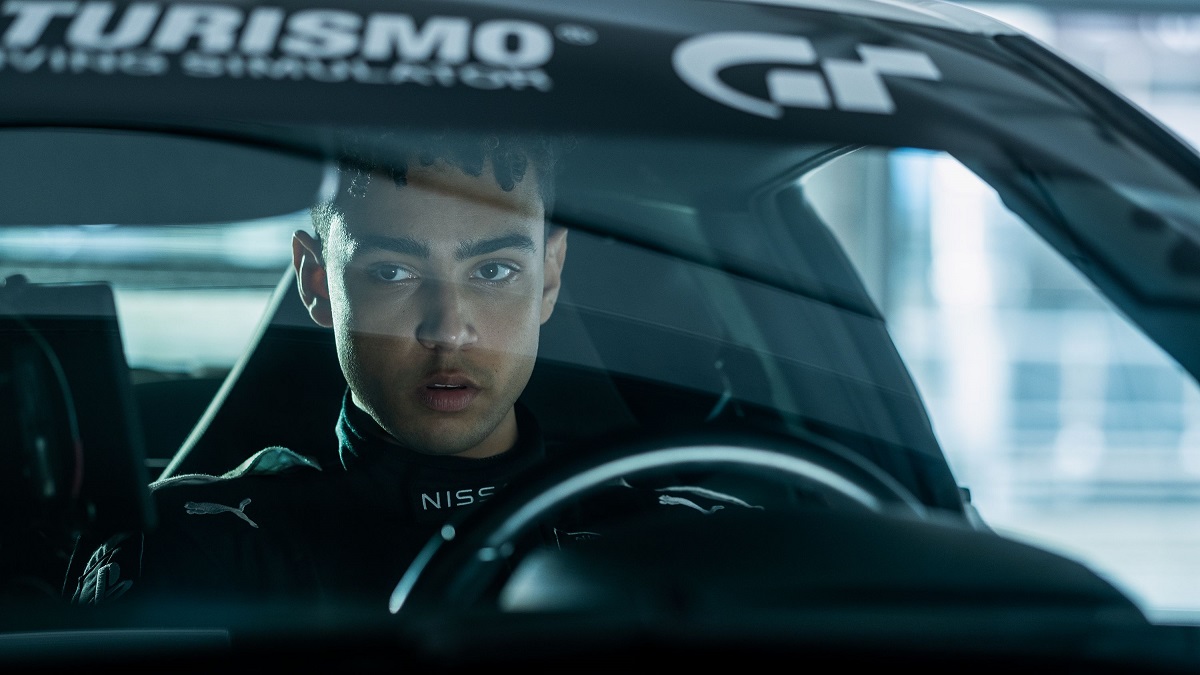
There’s a decent story worth telling around Gran Turismo, even if it has the same level of commercialism coursing throughout its veins. The famous racing game spawned a true story of racing so easily sellable it could’ve been a packaged deal. It’s the story of one player given a chance to prove themselves as a top Gran Turismo player and a racecar driver in reality. It’s an easy sell for a film, and it delivers precisely what it promises, where the tech expertise is more compelling than the so-so drama.
Jann Mardenborough (Archie Madekwe) is established as a British gamer who is a big fan of Gran Turismo. He’s not sure what he wants to do with his life, but he wants it to involve racing. His luck finally comes in when Nissan establishes a Gran Turismo academy. Top players like Jann will be trained for a chance to become a real racecar driver, going from their gamer chair to the driver’s seat.
Jack Salter (David Harbour) is tasked with training these drivers and is not exactly thrilled about working with gamers. He’s long worked with stuck-up drivers and suspects this lot will be no different. Or maybe he’ll form a bond with Jann and learn that this gamer knows more about racing than he thought. Of course, Jack and Jann will only have work thanks to the Nissan executive played by Orlando Bloom with the slick executive-style hair. They’ll have to prove they can master the track and win races, bringing up some questionable aspects of commercialism that are predictably left silent.
Neill Blomkamp was a fine choice for directing this picture, breaking from his usual science fiction genre. He styles the races in a fast-paced manner that is as competent as they are slick. It’d be so easy for these scenes to become a drag with too little editing or nauseating with too many fast cuts to the pumping of the engine and the sweat on the brow. Blomkamp’s direction during these moments is stellar.
The problem with this format is so much of the character gets lost in the dust. Jann and Jack are sadly reduced to a standard student-mentor relationship with little time to connect. Their discussion of racing rituals and music choices would be compelling if the film would only slow down enough to make these moments breathe. The film feels like it’s in such a rush to get to the next race that Jann’s love interest feels quickly tacked on, to the point where it feels like Jack has to remind Jann about flying his girlfriend out to races. I also didn’t appreciate that an emotional performance by Djimon Hounsou as Jann’s father is unfortunately bookended for this film.
And, oh my, the commercialism! I expected as much from a racing film where the cars are moving billboards. What I wasn’t expecting as much as the bookended segment of what looks like a behind-the-scenes demo reel for Gran Turismo’s video game development. As I stated previously, the underlying notion that all of this was possible because of a corporate decision is hardly addressed because it’s clear that Sony is pulling a lot of the strings here. It’s hard to appreciate the film on the level of simply being Jann’s story when so much of it was built on a corporation’s demands.
Despite the many kinks and rust of the sports drama genre, Gran Turismo is a better video game movie for its unique adaptation of a true story and having sufficient excitement. It’s a racing film that I wish I could love more, considering how fantastic the racing scenes are compared to the ho-hum drama of the characters. At the very least, the zippy speed of building the tension for the big Le Mans race has plenty of intensity and astuteness, making for a film that never bores but rarely deviates from its routine track.

 “Deadpool & Wolverine” Review
“Deadpool & Wolverine” Review  “The Boys: Season Four” Review
“The Boys: Season Four” Review  “The American Society of Magical Negroes” Review
“The American Society of Magical Negroes” Review  “Twisters” Review
“Twisters” Review  “Sausage Party: Foodtopia” Review
“Sausage Party: Foodtopia” Review  “Robot Dreams” Review
“Robot Dreams” Review  “Godzilla x Kong: The New Empire” Review
“Godzilla x Kong: The New Empire” Review  “Slave Play. Not a Movie. A Play.” Review
“Slave Play. Not a Movie. A Play.” Review 



